Originally posted on February 10, 2024 @ 6:10 pm
Are you wondering what you can buy with EBT in North Carolina? Look no further! In this guide, we’ll provide you with all the information you need about the NC EBT program and the eligible food and grocery items you can purchase with your benefits.
The EBT program in North Carolina is designed to help individuals and families access nutritious food options. Whether you’re looking for fresh fruits and vegetables, lean meats, or dairy products, your EBT benefits can be used to buy a variety of essential food items.
Table of Contents
Key Takeaways:
- The NC EBT program allows recipients to purchase a range of food and grocery items.
- Eligible items include fruits, vegetables, meats, dairy products, breads, cereals, snack foods, and non-alcoholic beverages.
- Certain items such as alcohol, tobacco, vitamins, supplements, and hot foods are not eligible for purchase with EBT.
- Approved EBT retailers in North Carolina include grocery stores, supermarkets, convenience stores, and farmer’s markets.
- EBT recipients in North Carolina can check their balance online using the Provider’s app.
Eligible Food Items
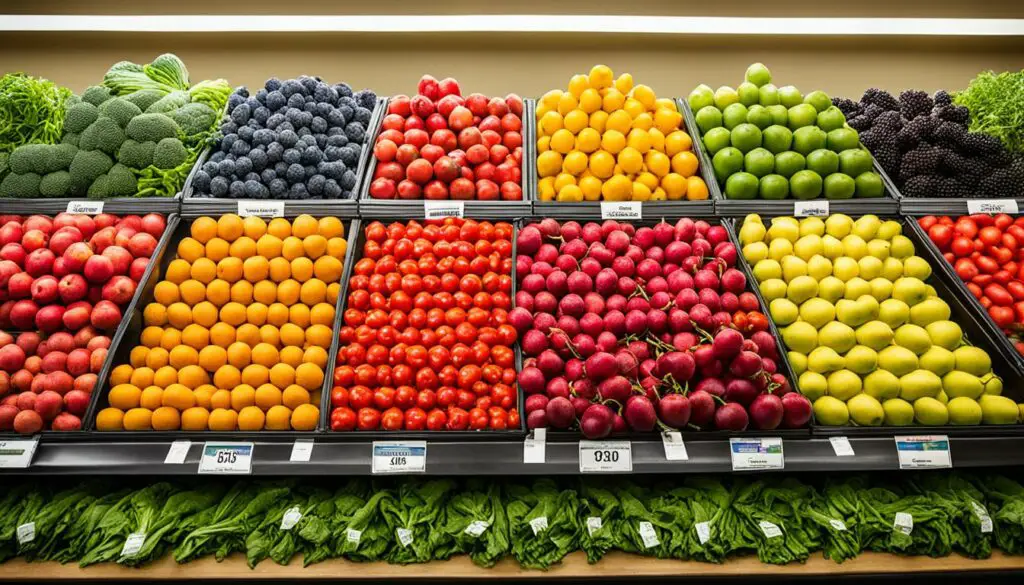
In North Carolina, the EBT program offers recipients the opportunity to purchase a wide range of food items. These eligible food items can be bought using EBT benefits at approved retailers throughout the state, ensuring access to nutritious meals and a balanced diet.
When it comes to EBT accepted items in NC, recipients have a variety of options to choose from. The program allows for the purchase of the following food items:
- Fruits
- Vegetables
- Meats
- Poultry
- Dairy products
- Breads
- Cereals
- Snack foods
- Non-alcoholic beverages
- Seeds/plants for food production
These food items are crucial for maintaining a healthy and balanced diet. The inclusion of fruits, vegetables, meats, dairy products, and other essential food groups ensures that EBT recipients have access to the nutrients needed to support their well-being.
Image:
By allowing the purchase of these food items, the EBT program empowers individuals and families to make informed choices and prioritize their nutritional needs. With EBT benefits, recipients can shop for these eligible items at authorized EBT retailers, including grocery stores, supermarkets, and convenience stores, among others.
In addition to the nutritional benefits, the EBT program also supports local farmers and encourages healthy eating habits within communities. By providing access to a range of eligible food items, the program promotes the availability and affordability of fresh produce, meats, and other essential ingredients.
Please note that the list of eligible food items mentioned above is not exhaustive. Recipients are encouraged to refer to official guidelines and resources to ensure compliance with the EBT program regulations and make the most of their benefits.
Non-Eligible Items
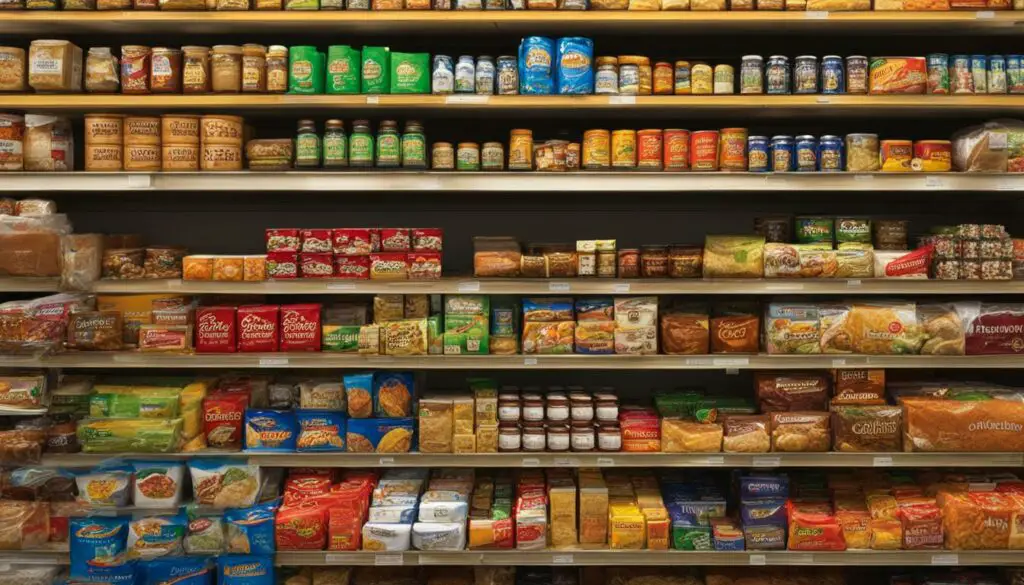
While the EBT program in North Carolina provides assistance to eligible individuals and families in purchasing essential food and grocery items, there are certain items that cannot be purchased with EBT benefits. It’s important to be aware of these non-eligible items to make informed choices when using your EBT card.
Non-Eligible Items Guidelines
The following items are not covered by the EBT program and cannot be purchased using EBT benefits in North Carolina:
- Alcohol
- Tobacco
- Vitamins and supplements
- Live animals (except shellfish and fish)
- Hot foods
- Pet foods
- Cleaning supplies
- Hygiene items
It’s essential to adhere to these guidelines to ensure that EBT benefits are used solely for eligible food and grocery items. Purchasing non-eligible items with EBT benefits is against program regulations and may result in penalties or loss of benefits.
It’s important to note that these non-eligible items are not covered by the EBT program and cannot be purchased using EBT benefits.
North Carolina EBT recipients should familiarize themselves with these guidelines to avoid any inadvertent misuse of their benefits.
Retailer Responsibility
Educating retailers on the EBT guidelines is crucial to ensure they only accept EBT cards for eligible items. Approved EBT retailers in North Carolina undergo a certification process to verify their compliance with program rules. By cooperating with authorized retailers, EBT recipients can confidently use their benefits to purchase eligible food and grocery items.
| Retailer Responsibility | Role |
|---|---|
| 1 | Adhere to EBT program guidelines by only accepting EBT cards for eligible food and grocery items |
| 2 | Display clear signage indicating EBT acceptance |
| 3 | Train staff to handle EBT transactions and answer customer inquiries |
| 4 | Keep accurate records of EBT transactions for auditing purposes |
By maintaining a cooperative relationship between EBT recipients and authorized retailers, the EBT program can continue to serve its intended purpose of providing food security to those in need.
| Retailer Responsibility | Role |
|---|---|
| 1 | Adhere to EBT program guidelines by only accepting EBT cards for eligible food and grocery items |
| 2 | Display clear signage indicating EBT acceptance |
| 3 | Train staff to handle EBT transactions and answer customer inquiries |
| 4 | Keep accurate records of EBT transactions for auditing purposes |
Both EBT recipients and authorized retailers play a vital role in upholding the integrity of the EBT program in North Carolina.
SNAP Retailer Eligibility
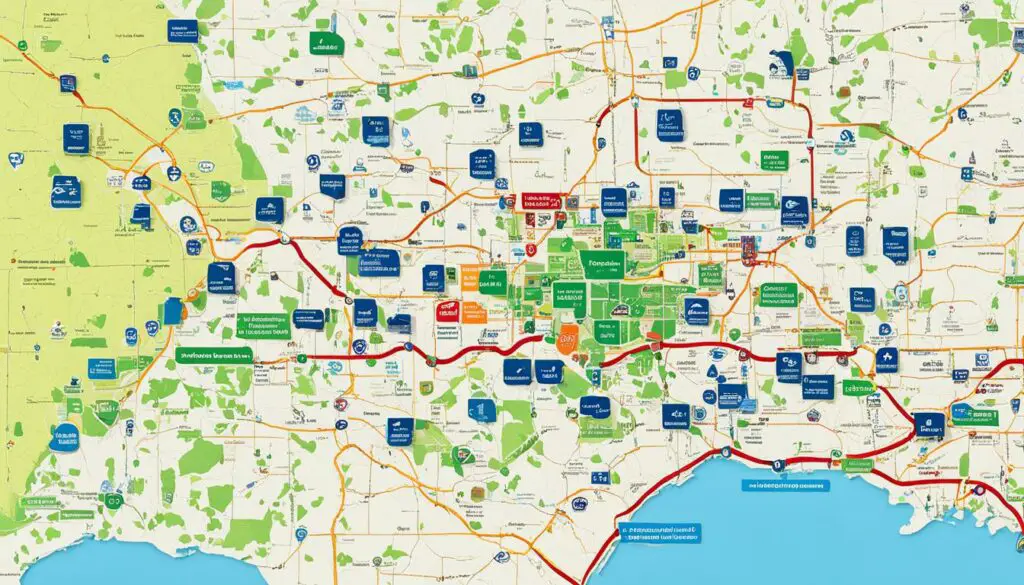
To accept EBT cards, retailers must meet certain eligibility requirements. In North Carolina, there are several approved EBT retailers that accept EBT benefits for eligible food items. These retailers include:
- Grocery stores
- Supermarkets
- Convenience stores
- Farmer’s markets
These approved retailers have been authorized by the USDA to participate in the EBT program and accept EBT cards as a form of payment. This allows EBT cardholders to conveniently purchase essential food items from a wide range of locations across North Carolina.
For individuals and families relying on EBT benefits, having a variety of EBT-accepted retailers ensures access to nutritious food options. Whether it’s a large supermarket or a local farmer’s market, there are numerous options available for EBT cardholders in North Carolina.
Benefits of EBT-Accepted Retailers
EBT-accepted retailers provide several advantages to EBT cardholders, including:
- Convenience: With a wide network of approved retailers, individuals can easily find a nearby store to purchase their groceries.
- Access to Fresh and Healthy Food: EBT-accepted retailers offer a range of fresh fruits, vegetables, meats, and dairy products, ensuring individuals and families have access to nutritious options.
- Diverse Food Choices: From large supermarkets with comprehensive food selections to local farmer’s markets offering locally-sourced produce, EBT cardholders have the flexibility to choose from a variety of food options.
- Supporting Local Communities: Shopping at farmer’s markets or locally-owned grocery stores not only benefits EBT cardholders but also supports local businesses and the community.
- Opportunities for Economical Shopping: EBT-accepted retailers often provide special discounts or promotions tailored to EBT cardholders, helping them stretch their food budgets further.
By partnering with approved EBT retailers, the EBT program in North Carolina ensures that eligible individuals and families have access to a wide range of food choices and can easily obtain the essential items they need. It’s important for EBT cardholders to be aware of the participating retailers in their area to make the most of their EBT benefits.
How to Check EBT Balance
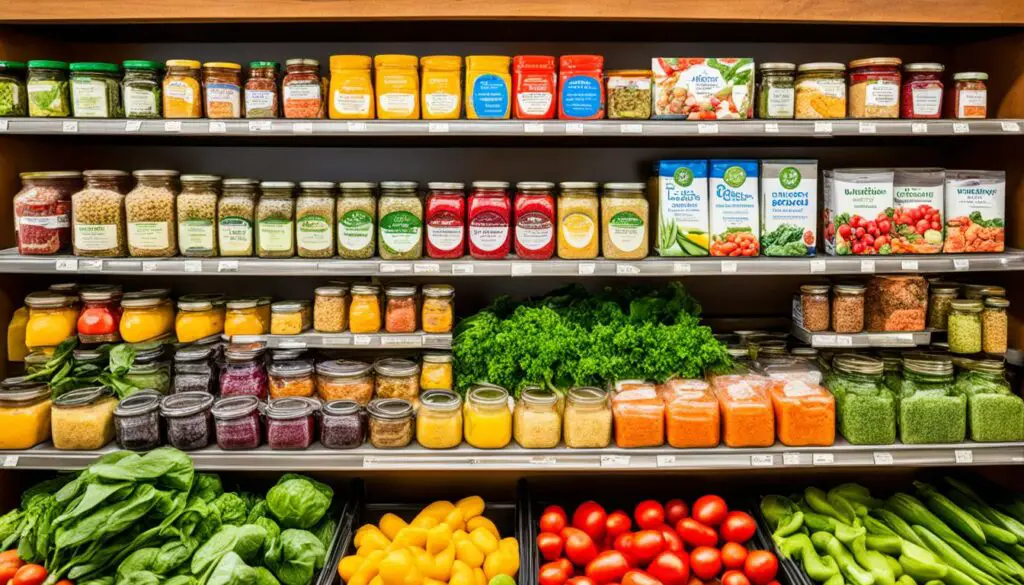
As an EBT cardholder in North Carolina, it’s important to stay informed about your current balance so you can plan your food and grocery shopping accordingly. Checking your EBT balance has never been easier with the Provider’s convenient app.
To check your EBT balance, simply follow these steps:
- Download the Provider’s app from the App Store or Google Play.
- Log in to your account using your EBT card information.
- Once logged in, you’ll be able to instantly view your current balance.
With just a few taps on your smartphone, you can access important information about your EBT benefits. The app provides a user-friendly interface that allows you to track your remaining balance quickly and conveniently.
By staying up-to-date with your EBT balance, you’ll have a better understanding of how much you can spend on eligible items at EBT card accepted retailers in North Carolina.
Manage Your EBT Benefits Anytime, Anywhere
The Provider’s app not only allows you to check your EBT balance, but it also provides additional features to help you manage your benefits. With the app, you can:
- Track your transaction history to monitor your purchases.
- Receive notifications about important updates, such as benefit deposits.
- Find EBT card accepted retailers in your area.
- Access helpful resources and FAQs related to the North Carolina EBT program.
Using the Provider’s app is a convenient way to take control of your EBT benefits and ensure you make the most out of the program. Stay informed, plan your shopping, and enjoy a more seamless experience with the EBT program in North Carolina.
Applying for Food Stamps
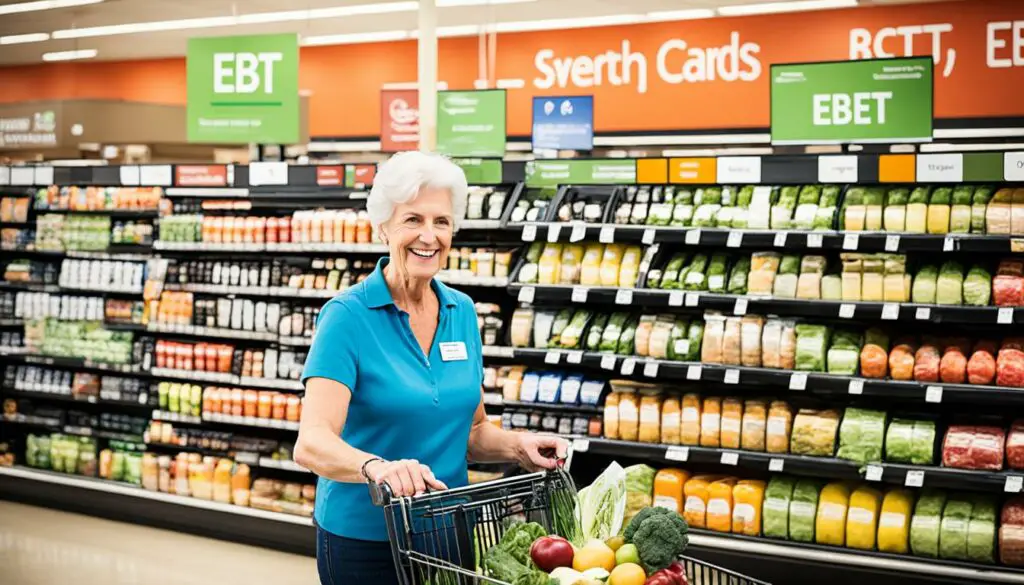
Applying for food stamps in North Carolina is a straightforward process that can be done online or in person. To save time and effort, the easiest way to apply is online through the official website or by calling the North Carolina SNAP hotline. By completing the application, individuals can determine their eligibility and potentially receive benefits through the EBT program.
During the application process, individuals will need to provide necessary personal and financial information to determine eligibility. This includes details about income, household size, and expenses. It’s important to provide accurate and up-to-date information to ensure a smooth approval process.
Once the application is submitted, it will be reviewed and assessed based on the eligibility criteria. The EBT program aims to support those who truly need assistance with accessing nutritious food and promoting food security. Eligibility determinations will consider factors such as income levels, household size, and expenses.
After the application has been processed and approved, individuals will receive their EBT card, which can be used to access benefits at approved retailers across North Carolina. It’s important to keep track of the balance on the EBT card and plan grocery shopping accordingly to make the most of the benefits.
Benefits of Applying for Food Stamps:
- Access to a wide range of eligible food items
- Promotes food security and nutritious meals
- Eases financial burden for eligible individuals and families
- Supports overall well-being and health
Applying for food stamps through the NC EBT program is a valuable resource for individuals and families in need. It provides a way to access essential food and grocery items, ensuring that everyone has the opportunity to maintain a healthy and balanced diet.
Renewing EBT Benefits
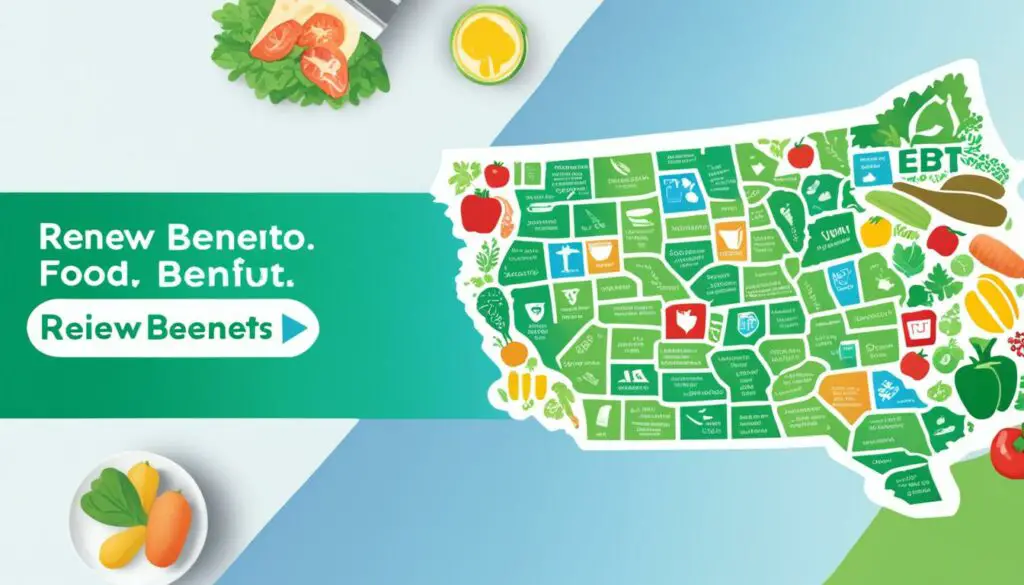
EBT benefits in North Carolina play a vital role in providing food security for eligible individuals and families. To continue receiving these benefits, it is important to renew them before the certification period ends. Most households have a 6-month certification period, while households with elderly or disabled members may have a 12-month certification period.
Applicants will receive a renewal notice from the North Carolina EBT program, informing them of their upcoming renewal date. Renewing EBT benefits can be done conveniently through the following methods:
- Online: Log in to the official North Carolina EBT website using your credentials. Follow the instructions provided to complete the renewal process. Make sure to have all necessary information and documents ready.
- Paper Form: If you prefer a paper-based renewal method, you can request a renewal form by contacting the North Carolina EBT hotline. Fill out the form accurately and return it via mail to the specified address.
It is essential to renew your EBT benefits on time to avoid any disruptions in your assistance. Take note of your renewal date and ensure that all required information is provided accurately. By renewing your EBT benefits, you can continue to access the support you need to provide nutritious meals for yourself and your family.
EBT Benefit Distribution
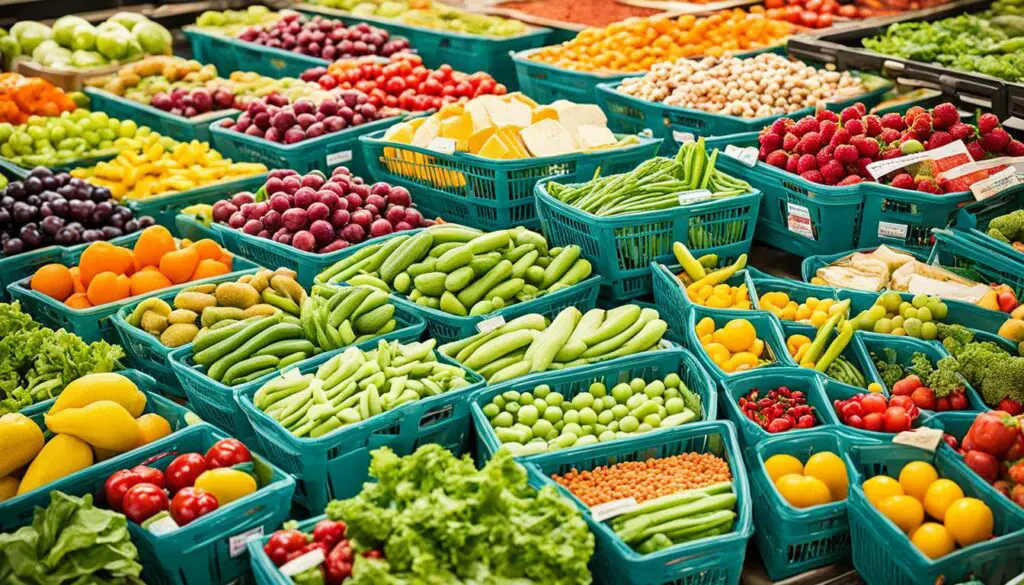
One of the key aspects of the EBT program in North Carolina is the distribution of benefits to eligible recipients. The timing of benefit distribution is based on the last digit of the recipient’s Social Security Number (SSN). Benefits are distributed between the 3rd and 21st of each month. By referring to the EBT benefit distribution schedule, recipients can determine the specific day they will receive their benefits.
| Last Digit of SSN | Benefit Distribution Dates |
|---|---|
| 0, 1 | 3rd |
| 2, 3 | 4th |
| 4, 5 | 5th |
| 6, 7 | 6th |
| 8, 9 | 7th |
| … | |
| Even digits | 20th |
| Odd digits | 21st |
It’s important for recipients to be aware of the benefit distribution schedule to plan their grocery shopping accordingly and ensure they can maximize the use of their EBT benefits throughout the month.
Getting Your EBT Benefits On Time
To ensure that you receive your EBT benefits on time, it’s crucial to keep your EBT card safe and secure. Misplaced, lost, or stolen EBT cards can delay the distribution of benefits, causing inconvenience and potential financial strain. If you have any issues with your EBT card, reach out to the North Carolina EBT hotline for immediate assistance and to request a replacement card.
Reporting Changes and Lost/Stolen EBT Cards
As a recipient of EBT benefits in North Carolina, it is important to stay up-to-date with any changes in your household that may affect your eligibility or benefit amount. Promptly reporting these changes ensures that you receive the correct amount of assistance and helps prevent any potential issues in the future.
Here are some common changes that should be reported:
- Moves to a new address
- Financial changes such as a job change, increase or decrease in income
- Substantial lottery or gambling winnings
North Carolina EBT recipients generally have two reporting timeframes:
- Twice a year: If there are no changes to report, you are required to complete a mid-certification review within the specified timeframe.
- Within 10 days: If there are changes in your household, such as a move or financial changes, you must report them within 10 days to ensure accurate EBT benefit calculation.
Reporting changes can be done through the official North Carolina EBT website or by contacting the North Carolina EBT hotline.
Additionally, if your EBT card is lost or stolen, it is crucial to take immediate action to protect your benefits. Notify the North Carolina EBT hotline as soon as possible to report the issue and request a replacement card. This will help prevent unauthorized use of your benefits and ensure that you can continue to access your EBT benefits.
Remember, timely reporting of changes and taking the necessary steps in case of a lost or stolen EBT card is essential to maintaining the integrity of the NC EBT program and ensuring that eligible individuals receive the support they need.
WIC Benefits
While the EBT benefits cover a wide range of food items, recipients who are pregnant or new parents may also be eligible for Women, Infants, and Children (WIC) benefits. WIC provides additional support to ensure access to nutritious foods for women, infants, and young children.
WIC food packages include:
- Cereal
- Juice
- Eggs
- Milk
- Peanut Butter
- Fruits
- Vegetables
- Whole-Wheat Bread
Additionally, WIC offers support for breastfeeding moms, which includes counseling and education on proper nutrition during lactation. For infants, WIC provides baby food to ensure their nutritional needs are met.
To learn more about WIC benefits and how to apply, visit the official North Carolina WIC website.
| WIC Food Packages | Description |
|---|---|
| Cereal | A variety of cereals fortified with essential vitamins and minerals. |
| Juice | 100% fruit juices without added sugars. |
| Eggs | Fresh eggs for protein and essential nutrients. |
| Milk | Dairy milk for calcium and vitamin D. |
| Peanut Butter | A healthy source of protein and fats. |
| Fruits | A variety of fresh, frozen, or canned fruits. |
| Vegetables | A selection of fresh, frozen, or canned vegetables. |
| Whole-Wheat Bread | Nutritious whole-wheat bread for fiber and energy. |
Additional Assistance Programs
For families who are facing financial hardships beyond food insecurity, there are additional assistance programs available in North Carolina. These programs aim to provide support during challenging times and help individuals and families meet their basic needs.
Temporary Assistance for Needy Families (TANF)
The Temporary Assistance for Needy Families (TANF) program is designed to offer cash assistance to families with children who are experiencing financial difficulties. TANF provides financial support to help cover essential expenses such as rent, utilities, and other basic needs.
Eligible individuals and families who are already receiving benefits through the NC EBT program can apply for TANF benefits alongside their EBT benefits. TANF benefits can provide an additional layer of support during times of financial instability, helping families bridge the gap and meet their immediate needs.
It’s important to note that TANF benefits are subject to eligibility criteria and specific guidelines set by the state of North Carolina. To determine eligibility and apply for TANF benefits, individuals can contact their local Department of Social Services (DSS).
Here is a table summarizing the key information about the TANF program:
| TANF Program | Eligibility | Benefits |
|---|---|---|
| Temporary Assistance for Needy Families (TANF) | Varies based on income, assets, household size, and other factors | Cash assistance to cover basic needs such as rent, utilities, and essential expenses |
“The TANF program provides crucial financial support to families in need, helping to alleviate the burden of financial hardship and ensure the well-being of children and parents alike.”
By offering cash assistance, the TANF program helps eligible families navigate difficult financial circumstances and work towards achieving self-sufficiency. It is an essential resource for those in need and complements the support provided by the NC EBT program.
Conclusion
The EBT program in North Carolina, part of the NC EBT program, is a crucial initiative that helps ensure food security for eligible individuals and families in the state. By providing access to essential food and grocery items, EBT benefits play a vital role in promoting nutritious meals and supporting overall well-being.
In addition to the EBT program, North Carolina also offers other assistance programs such as Women, Infants, and Children (WIC) benefits and Temporary Assistance for Needy Families (TANF) cash assistance. These programs provide additional support for eligible individuals and families, helping them navigate challenging times with dignity and support.
To make the most of the EBT program and other assistance programs, it is crucial to stay informed about the eligible food items, retailer eligibility, and reporting requirements. By understanding the guidelines and requirements, individuals and families can effectively utilize their benefits and access the necessary resources for nourishment and well-being.
The EBT program in North Carolina, along with complementary assistance programs, demonstrates the state’s commitment to ensuring that vulnerable populations have access to nutritious food and necessary support. By leveraging these resources, eligible individuals and families can enhance their quality of life and work towards a brighter future.
FAQ
What food items can be purchased with EBT in North Carolina?
Eligible food items that can be purchased with EBT in NC include fruits, vegetables, meats, poultry, dairy products, breads, cereals, snack foods, non-alcoholic beverages, and seeds/plants.
What items cannot be purchased with EBT in North Carolina?
Non-eligible items for EBT purchase in North Carolina include alcohol, tobacco, vitamins, supplements, live animals (except shellfish and fish), hot foods, pet foods, cleaning supplies, and hygiene items.
Which retailers accept EBT cards in North Carolina?
Approved EBT retailers in North Carolina include grocery stores, supermarkets, convenience stores, and farmer’s markets.
How can I check my EBT balance in North Carolina?
EBT cardholders in North Carolina can check their balance online using the Provider’s app. Simply download the app and log in to your account to instantly view your current balance.
How can I apply for food stamps in North Carolina?
To apply for food stamps in North Carolina, individuals can complete the application process online or in person through the official website or by calling the North Carolina SNAP hotline.
How do I renew my EBT benefits in North Carolina?
EBT benefits in North Carolina need to be renewed before the certification period ends. Applicants will receive a renewal notice and can renew their benefits online or through a paper form.
When are EBT benefits distributed in North Carolina?
In North Carolina, EBT benefits are distributed between the 3rd and 21st of each month based on the last digit of the recipient’s Social Security Number (SSN).
What should I do if there are changes to my household or if my EBT card is lost or stolen?
EBT recipients in North Carolina are required to report changes to their household within a specified timeframe and should contact the North Carolina EBT hotline to report a lost or stolen EBT card and request a replacement.
Are there additional assistance programs available in North Carolina?
Yes, for families facing financial hardships beyond food insecurity, additional assistance programs such as the Temporary Assistance for Needy Families (TANF) program provide cash assistance to eligible individuals and families.
How does the EBT program in North Carolina help ensure food security?
The EBT program in North Carolina allows eligible individuals and families to purchase essential food and grocery items, providing nutritious meals and supporting overall well-being.
Source Links
- https://www.fns.usda.gov/snap/eligible-food-items
- https://worldrelief.org/content/uploads/2021/12/SNAP-Food-You-Can-Buy-With-North-Carolina-EBT-Car1-1.pdf
- https://www.joinproviders.com/state/north-carolina/
See also:
Leave a Reply